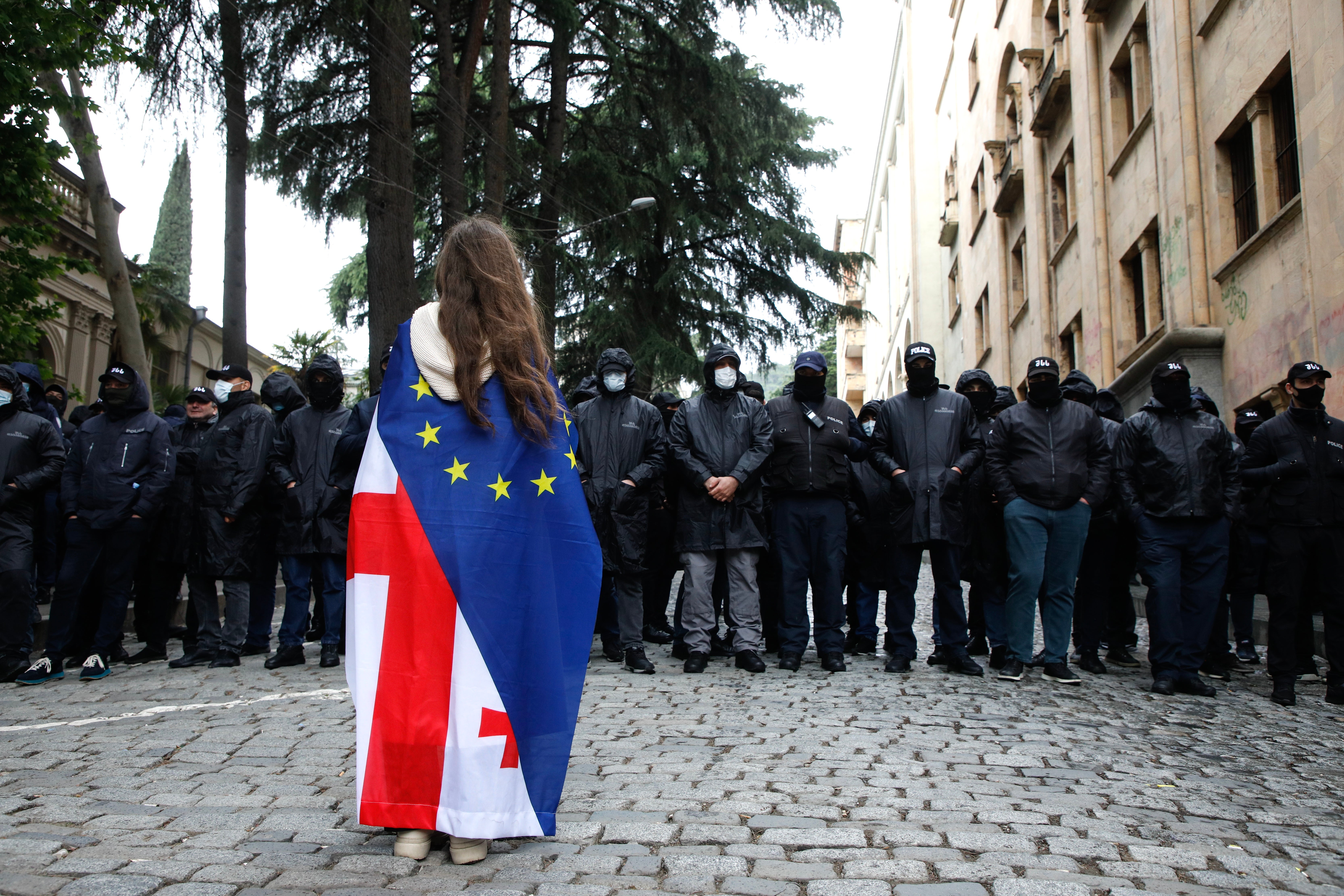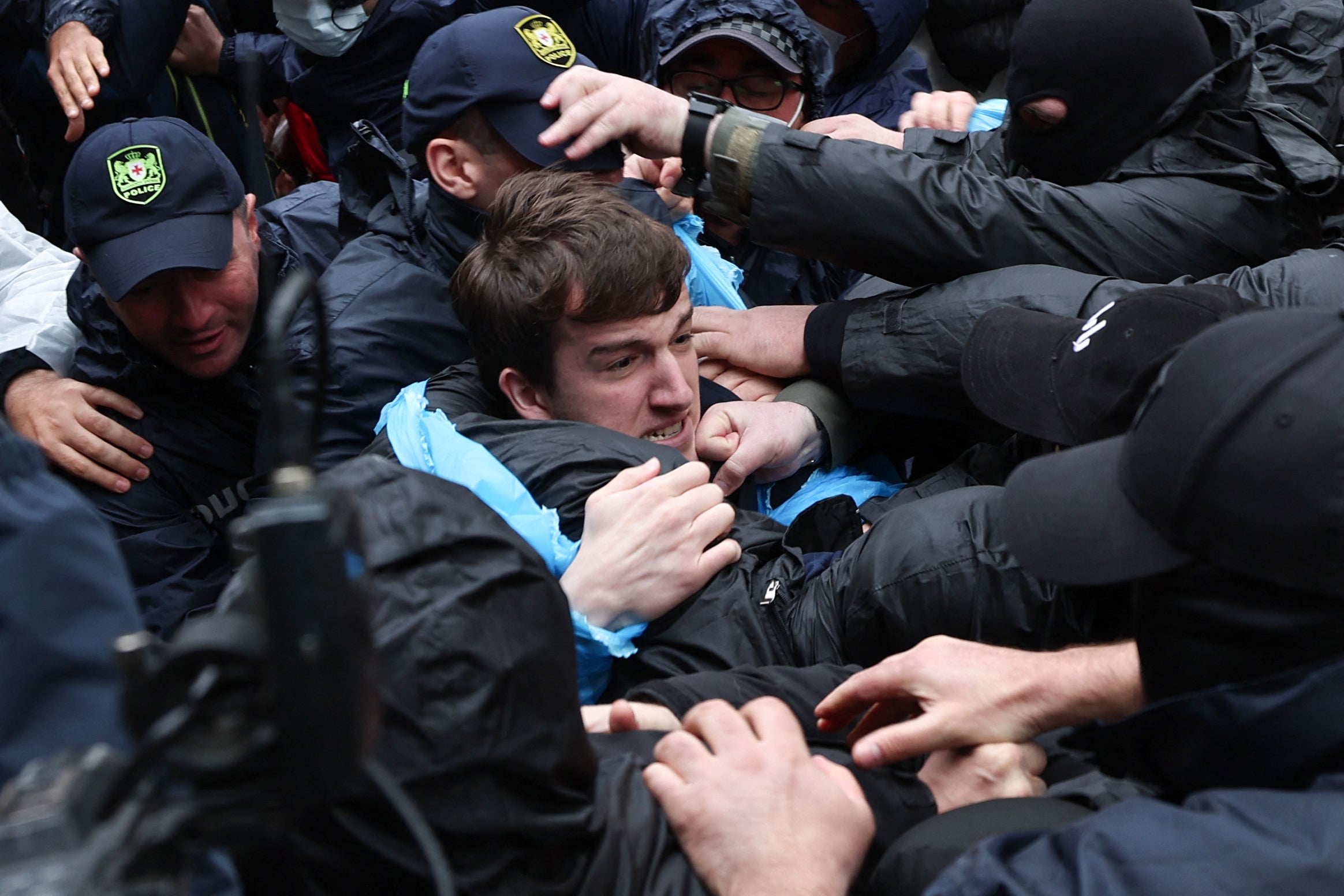Georgia: Politicians fight in parliament as bill dubbed ‘The Russian law’ approved amid mass protests
Georgian politicians brawled in Tbilisi on Tuesday during a debate on the third and final reading of the bill
Your support helps us to tell the story
From reproductive rights to climate change to Big Tech, The Independent is on the ground when the story is developing. Whether it's investigating the financials of Elon Musk's pro-Trump PAC or producing our latest documentary, 'The A Word', which shines a light on the American women fighting for reproductive rights, we know how important it is to parse out the facts from the messaging.
At such a critical moment in US history, we need reporters on the ground. Your donation allows us to keep sending journalists to speak to both sides of the story.
The Independent is trusted by Americans across the entire political spectrum. And unlike many other quality news outlets, we choose not to lock Americans out of our reporting and analysis with paywalls. We believe quality journalism should be available to everyone, paid for by those who can afford it.
Your support makes all the difference.The Georgian parliament has approved in its third and final reading a divisive bill that sparked weeks of mass protests and saw politicians fighting each other.
The bill requires media and non-governmental organisations as well as other non-profits to register as “pursuing the interests of a foreign power” if they receive more than 20% of their funding from abroad.
Critics see it as a threat to democratic freedoms and the country’s aspirations to join the European Union.
Georgian politicians brawled in parliament on Tuesday during a debate on the third and final reading of the bill that has plunged the South Caucasus country into a crisis and sparked mass protests.
Georgia television broadcast scuffles between ruling party and opposition lawmakers, who pushed each other and gesticulated angrily during debates on the bill, which government critics and Western countries have criticised as authoritarian and Russian-inspired.
Georgian President Salome Zourabichvili has said she will veto the bill. But parliament, which is controlled by the ruling party, can override her veto, setting the scene for further protests in a crisis that may determine whether Georgia stays on a path towards integration with Europe or pivots back towards Russia.
The bill would require organisations receiving more than 20% of their funding from abroad to register as agents of foreign influence, imposing onerous disclosure requirements and punitive fines for violations.
Opponents have dubbed the bill “the Russian law”, comparing it to Russian legislation used to target critics of Vladimir Putin’s Kremlin.
Georgia‘s government says the bill is needed to promote transparency, combat “pseudo-liberal values” promoted by foreigners and preserve the country’s sovereignty.

As Tuesday’s debate got under way, about 1,000 protesters picketed the fortress-like parliament building amid a major police presence, with water cannon idling nearby.
Demonstrations have been running for weeks and typically peak in the evening, where crowds numbering in the tens of thousands have mounted some of the biggest protests seen in Georgia since it regained independence from Moscow in 1991.
The European Union, which gave Georgia candidate status in December, has repeatedly said that the bill will be a barrier to Tbilisi’s further integration with the bloc.
The ruling Georgian Dream party says it wants to join both the EU and NATO, even as it has adopted harsh anti-Western rhetoric in recent months.
Polls show Georgian public opinion is strongly supportive of EU integration, while many Georgians are hostile to Russia over Moscow’s support for the breakaway regions of South Ossetia and Abkhazia.

The Kremlin, which denies any role in inspiring the Georgian bill, said on Tuesday that the crisis was Tbilisi’s internal affair and accused outside powers of meddling.
“We see an unveiled intervention in the internal affairs of Georgia from the outside,” Kremlin spokesman Dmitry Peskov said.
“This is an internal matter of Georgia, we do not want to interfere there in any way.”
The United States, Britain, Germany, Italy and France all urged Georgia to withdraw the bill.

Join our commenting forum
Join thought-provoking conversations, follow other Independent readers and see their replies
Comments